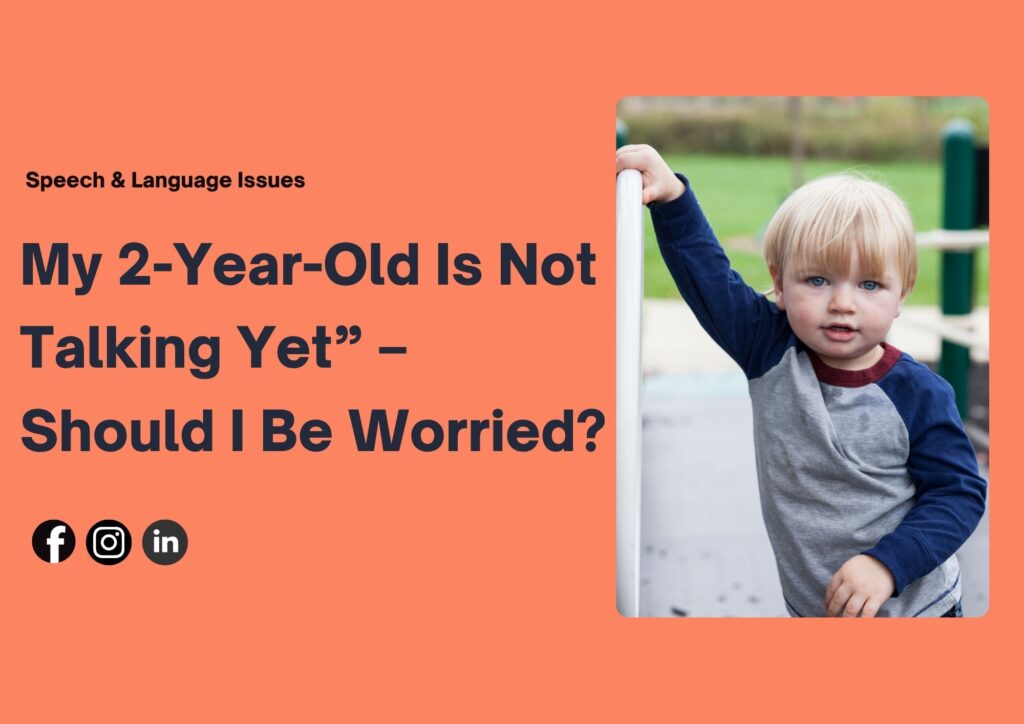
Understanding Delayed Language Development in Toddlers
It’s one of the most common concerns parents bring to us at Neuronurture Kids: “My child is 2 years old and still not talking. Is this normal?”
If you’re asking this, you’re not alone—and you’re absolutely right to seek answers. As pediatric speech-language experts who work with children every day, we’ll help you understand what typical speech and language development looks like at age 2, what may be signs of delay, and what actions you can take.
What Is Considered “Normal” Speech & Language Development at Age 2?
By the time a child turns 2, they usually:
-
- Use at least 50 words
-
- Combine two words (like “want milk” or “go park”)
-
- Understand simple commands (e.g., “Come here,” “Give me the ball”)
-
- Point to objects or images when named
-
- Show interest in using language to communicate
Milestone Tip Box:
Even if they don’t speak clearly, the intention to communicate and attempts at words are important milestones in language development.
When Should You Be Concerned?
Here are red flags for language delay or speech difficulties in 2-year-olds:
-
- Not saying any recognizable words
-
- Not imitating sounds or words
-
- Doesn’t follow basic instructions
-
- Rarely uses gestures like pointing or waving
-
- Poor eye contact or shared attention
-
- Seems not to understand spoken language
If your child shows two or more of the above, consult a Developmental Pediatrician or a certified speech-language pathologist.
Parent Insight:
Trust your instincts—early intervention in speech and language can change the course of development dramatically.
Yes, it can play a role. Passive screen time (like cartoons) reduces the face-to-face interactions that are crucial for language learning.
Why Might a 2-Year-Old Not Be Talking?
There are many reasons a toddler might have delayed language development, including:
1. Developmental Language Delay
Some kids are simply late talkers. With the right support, they often catch up.
2. Hearing Impairments
Even mild hearing issues, often caused by ear infections, can affect speech perception and production.
3. Autism Spectrum Disorder (ASD)
Delayed speech, limited eye contact, repetitive behavior, and low social engagement may indicate ASD.
4. Speech Sound Disorders
The child wants to talk but struggles to form sounds correctly.
5. Environmental Factors
Limited interaction, minimal conversation at home, or excessive screen time can negatively affect language development.
Is Screen Time to Blame?
A frequent question we hear:
“Is my child not talking because of screen time?”
According to the Indian Academy of Pediatrics:
-
- No screen time before 2 years
-
- Limited and interactive screen use after that
What Can Parents Do at Home?
You don’t need expensive toys or learning apps. The best language tools? Your time, voice, and connection.
Simple At-Home Strategies:
-
- Narrate daily routines: “Now we’re washing hands!”
-
- Use short, clear sentences
-
- Pause and wait for your child to respond
-
- Read aloud every day, even if they don’t speak
-
- Use expressive gestures and facial cues
-
- Focus on commenting over questioning
Language Tip Box:
❌ Don’t say: “What is this?”
✅ Say: “It’s a red ball! The ball is bouncing!”
When to Seek Professional Help?
If your 2-year-old speaks few or no words, it’s time to get a developmental evaluation. A licensed therapist will assess:
-
- Receptive and expressive language skills
-
- Speech clarity and sound development
-
- Social communication behaviors
-
- Hearing and medical history
-
- Cognitive and motor milestones
Why It Matters Box:
Early therapy isn’t just about talking—it builds the foundation for learning, behavior, emotional bonding, and confidence.
Book a free 10-minute consultation with our team
WhatsApp: +91 74117 49796
Visit Neuronurture Kids for online therapy support.
While every child develops at their own pace, language is too important to ignore. If your toddler isn’t talking by age 2, don’t wait.
At Neuronurture Kids, our team of expert speech-language therapists and developmental pediatricians work with families to offer play-based online therapy programs tailored to your child’s unique journey.
Explore helpful parent guides and free tools in our Resource Library